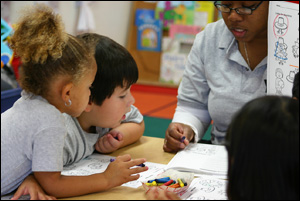 When it comes to providing the best education for children with special needs and learning difficulties, the debate still rages on. Many parents believe enrolling their children into special schools will provide them with the best education and stimulation for learning.
When it comes to providing the best education for children with special needs and learning difficulties, the debate still rages on. Many parents believe enrolling their children into special schools will provide them with the best education and stimulation for learning.
Others believe that letting their children with learning difficulties remain part of the mainstream education system will not only help them have a good education, but also allow them to be part of a society that needs to continue to embrace difference.
One of the many problems in this argument is that the term ‘special needs’ encompasses a number of different types of learning problems. For example, a child who is slightly hard of hearing is classed as special needs alongside a profoundly autistic child. Obviously, in an educational setting their needs will be vastly different but still they are labeled in the same way.
As well as this, parents of children with special needs have very differing views. Some believe specialist schools are better equipped and focused on their child’s needs, while others say that special schools don’t do enough to integrate their children into society or give them the chance to grow and learn with their peers.
Mainstream or Specialist?
It seems that every case is an individual one, based on the needs of the child and how they can best be provided for during their education. When it comes to government thinking, however, recent developments have seen more children included in mainstream schools, leading to a number of special schools closing. The result of these changes has been that special-needs children are being inadequately provided for, affecting both their learning and the education of those around them.
So perhaps rather than choosing between mainstream schools and special schools, the issue should be about how to ensure mainstream schools provide the right resources to include these children effectively. The obvious benefits of a specialist school are that they have the right equipment on hand and staff with expert training and skills enabling them to enhance each child’s education. But could this not be done in mainstream schools too? Investing in school refurbishment and specialist training for staff could bring great advantages.
Different Levels
All children, whether they have learning difficulties or not, work at different levels and this is generally catered for in day-to-day activities. With the right resources on hand and support from skilled staff, these levels could extend to children with special needs as well. Simple things such as a different way of delivering information, having extra help from an adult or having specialist equipment such as a computer on hand can make the transition to mainstream schooling easier for everyone.
Working with schools to plan specifically designed educational areas will help, as having the right surroundings makes things easier for both children and teachers. Yes, there will be a certain expense in bringing many mainstream schools up to date with facilities, but special schools are expensive to run as well and if the changes will benefit all students then they will be worth it.
About the author: Zoe is a professional blogger and freelance writer with a keen interest in education. She is currently writing on behalf of Innnova Solutions.
Photo credit: Anissa Thompson